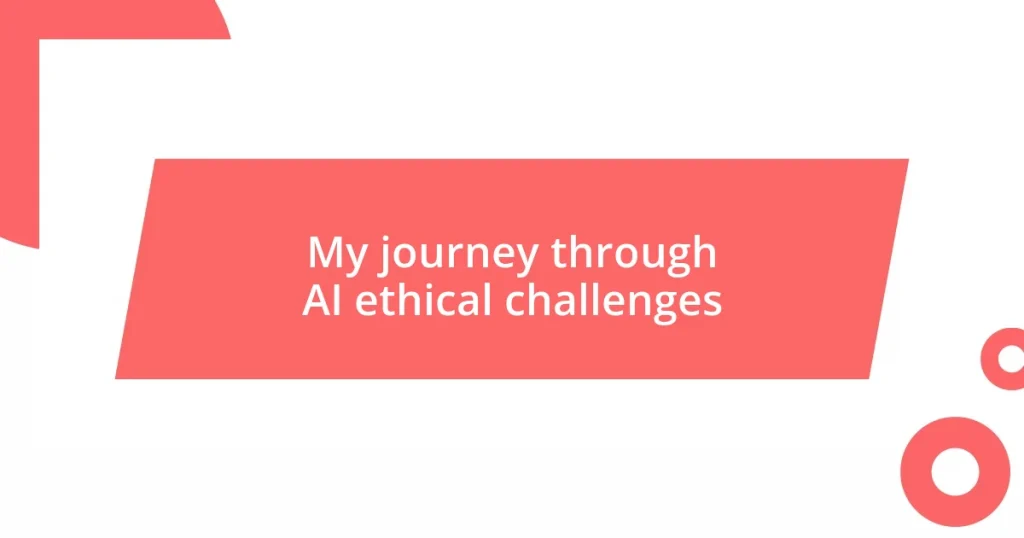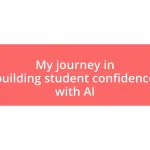Key takeaways:
- AI ethics encompasses the balance between innovation and responsibility, prompting discussions about accountability and human judgment.
- Key ethical challenges include bias in data and lack of transparency, which can lead to misrepresentation and distrust in AI systems.
- Engaging stakeholders and utilizing assessment tools like the Ethical AI Toolkit and Value-Sensitive Design are essential for fostering responsible AI development.
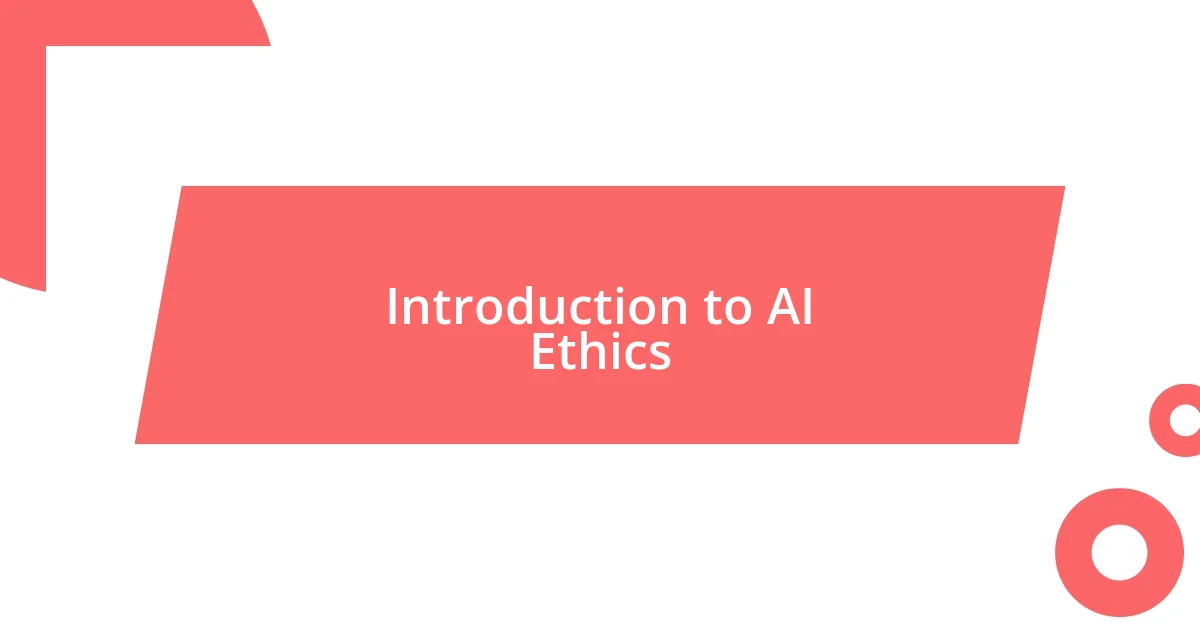
Introduction to AI Ethics
AI ethics is an increasingly vital field that navigates the moral implications of artificial intelligence in our lives. I remember a moment when I first realized the depth of these challenges while discussing a project with colleagues. We pondered questions like, “Should machines make decisions for us?” This sparked a whirlwind of thoughts on accountability and the essence of human judgment.
As I delved deeper into AI ethics, I found myself grappling with the balance between innovation and responsibility. One day, while reading an article on bias in AI algorithms, I felt a wave of frustration. It made me question how something designed to enhance our lives could also inadvertently perpetuate societal biases. Have you ever wondered if technology is truly a force for good, or does it sometimes reflect our shortcomings?
Engaging with AI ethics means embracing the complexity of its intersection with our values, safety, and privacy. It’s not just a theoretical discussion; it’s about our daily lives and future decisions. I often reflect on how these ethical considerations can shape the next generation of technology—after all, the choices we make today can have lasting impacts tomorrow.
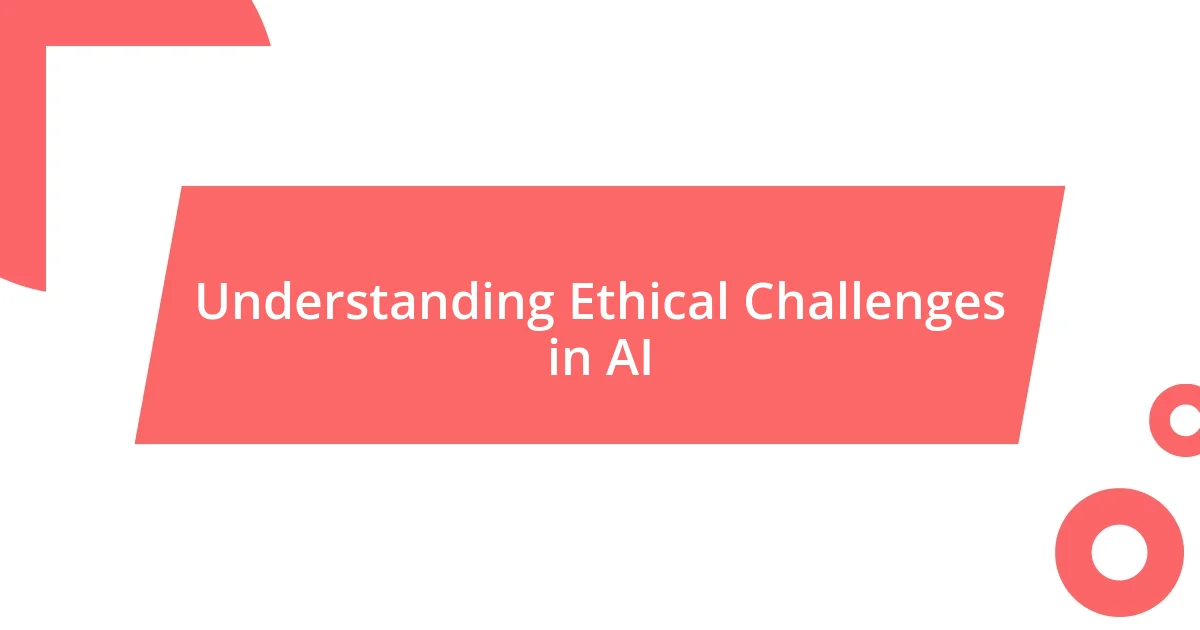
Understanding Ethical Challenges in AI
Understanding the ethical challenges in AI often requires us to confront uncomfortable truths. While working on a machine learning project, I found myself questioning the very data we used to train our models. I was struck by the realization of how crucial it is to ensure that our data represents diverse perspectives. Failing to do so could mean not just inaccuracies but also reinforcing existing inequalities.
The question of transparency is another essential challenge that haunts my understanding of AI ethics. A few months ago, I attended a conference where a speaker shared a captivating case of an AI system making life-altering decisions without revealing its reasoning. I felt an unsettling mix of awe and dread—could we really trust such systems? It reminded me that ethical AI development requires not just innovative algorithms but also clear communication about how and why decisions are made.
As I navigate through the ethical maze of AI, I often reflect on the dual-edged nature of technology. There’s a profound excitement that comes with innovation, yet it’s accompanied by a responsibility to ensure that these innovations do not come at the cost of human values. I often think about my role in shaping these technologies and whether I’m truly contributing to a better world or simply following the tide of progress without questioning its implications.
| Ethical Challenge | Description |
|---|---|
| Bias in Data | Data used for training can reflect existing societal biases, leading to unfair outcomes. |
| Lack of Transparency | AI systems sometimes operate as black boxes, making it difficult to understand their decision-making process. |
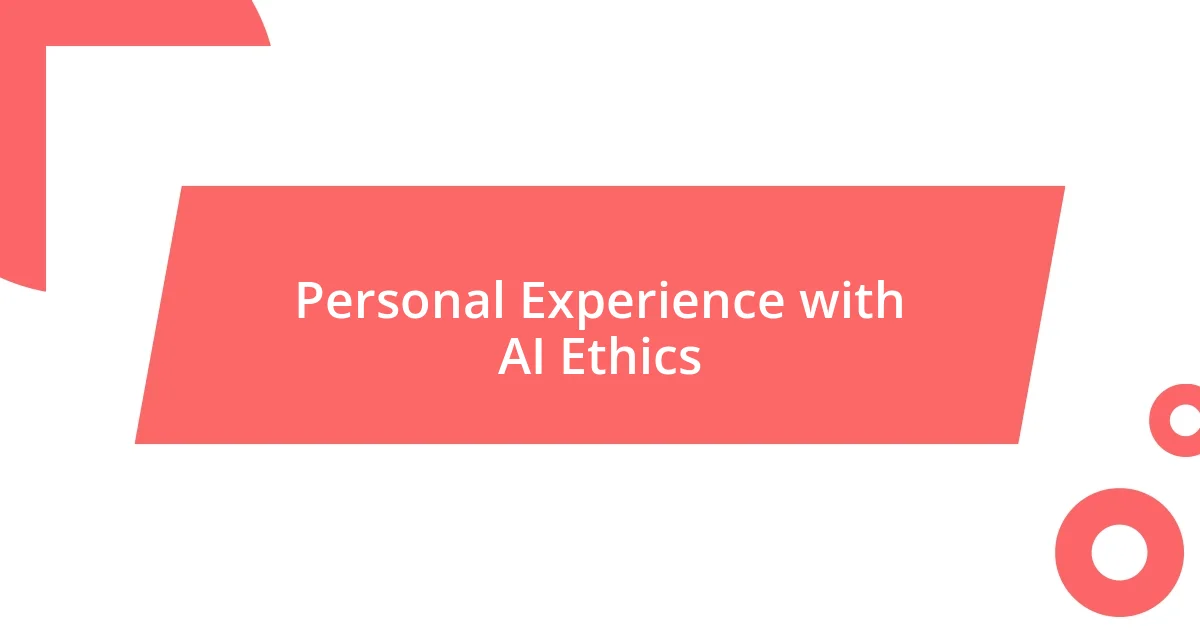
Personal Experience with AI Ethics
Navigating the ethical landscape of AI has deeply impacted me, particularly during a data analysis project where I discovered unexpected biases. As I sifted through the data, I felt a sinking realization of how easy it is to overlook the nuances that shape our understanding. The implications weighed heavily on my mind—what if our models not only failed to serve our users but actively misrepresented them? This revelation was a turning point, reminding me that every line of code carries the responsibility to represent the world accurately and fairly.
Reflecting on my experiences, I’ve come to recognize several key ethical challenges that often arise:
- Responsibility for Outcomes: I learned that developers must take ownership of the consequences of their creations, not just the technological advancements.
- Inclusive Data Representation: My experiences taught me the necessity of involving diverse stakeholders to capture varying perspectives and reduce bias.
- User Trust: In one instance, I shared findings with colleagues, realizing that transparency is essential for fostering trust. If users don’t understand the “why” behind AI decisions, skepticism will flourish.
These challenges have not only shaped my understanding of AI ethics but also my approach to creating technology that honors human values and diversity.
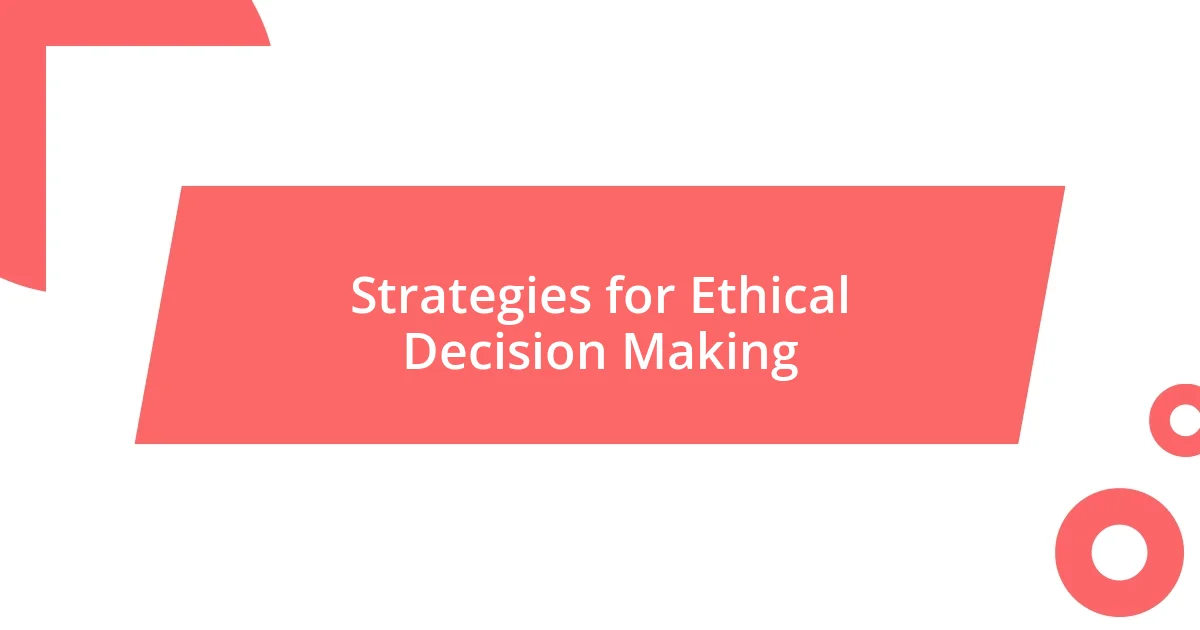
Strategies for Ethical Decision Making
When it comes to ethical decision-making in AI, I’ve found that adopting a structured approach can be incredibly helpful. One strategy that resonates with me is the “ethical impact assessment.” I remember conducting one for a project where we aimed to deploy an AI tool in hiring processes. This exercise pushed my team to critically evaluate how our algorithms might affect candidates from diverse backgrounds. We engaged in intense discussions about potential outcomes, fostering a richer understanding of our responsibilities.
Being part of a multidisciplinary team also proved invaluable. At one point, our group included ethicists, sociologists, and engineers, all of whom brought their unique perspectives to the table. By creating an open environment for dialogue, I realized how crucial it is to challenge our biases collectively. Have you ever experienced a moment when someone’s differing opinion changed your viewpoint? For me, that’s the magic of collaboration in making ethical decisions—it’s about listening and evolving.
Lastly, I’ve learned that documenting our ethical considerations is not just a formality; it’s a commitment to accountability. After a challenging project, I started a habit of journaling our ethical dilemmas and decisions. This practice helped me reflect deeply on the choices we made, ensuring that I don’t repeat past mistakes. Each entry became a reminder of the weight our decisions carry, inspiring me to strive for fairness and transparency in every future endeavor. How do you ensure you’re holding yourself accountable in your work? For me, writing has become an essential tool in my ethical toolkit.
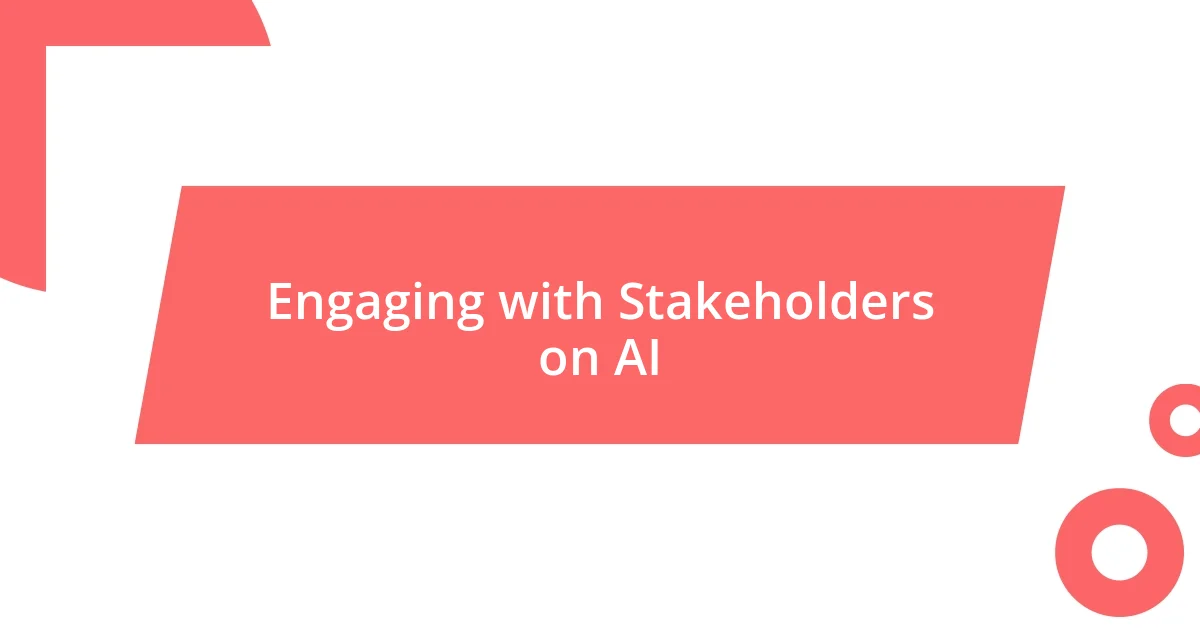
Engaging with Stakeholders on AI
Engaging stakeholders in AI projects is crucial for addressing ethical challenges. I once participated in a roundtable discussion with various stakeholders, including community representatives, data scientists, and policymakers. The conversation was lively and eye-opening; it felt like peeling back layers of an onion, revealing differing viewpoints and concerns I hadn’t considered. How often do we assume all voices are heard, only to find that many have been left out?
During one project focused on implementing AI in healthcare, I realized how vital it is to hear from those directly affected by the technology. We organized focus groups with patients and healthcare providers, which uncovered challenges that our development team had overlooked. Their stories sparked an emotional connection, compelling us to prioritize features that truly served their needs. Can you recall a moment when a user’s experience changed the direction of a project for the better? For me, it reinforced the idea that genuine engagement leads to more empathetic solutions.
Ultimately, I’ve learned that building relationships with stakeholders is a continuous journey. It’s not just a box to check off; it demands ongoing communication and trust-building. When I reach out for feedback, I approach it with an open heart and mind, ready to adapt based on what I hear. Each interaction becomes a lesson in humility and growth, reminding me that we’re all in this together, navigating the complex world of AI ethics side by side.
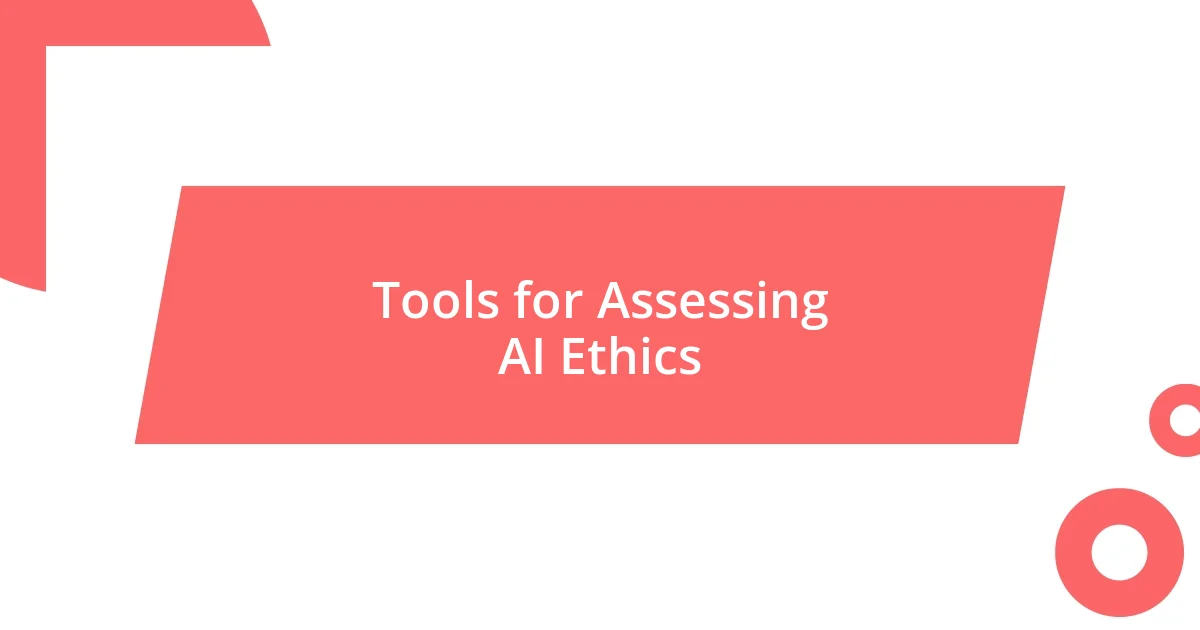
Tools for Assessing AI Ethics
When it comes to tools for assessing AI ethics, I’ve found that frameworks like the “Ethical AI Toolkit” can be incredibly effective. I remember using it for an AI project in a retail setting, where the implications for consumer fairness were significant. This toolkit prompted us to analyze not only the technical efficacy but also the moral dimensions of our algorithms, asking questions like: “Is it fair for the AI to prioritize certain demographics over others?” It made me realize that ethical assessments must encompass a broad view of potential impacts.
Another powerful tool I’ve employed is the “Value-Sensitive Design” approach. In one instance, while developing an AI-driven recommendation system, we engaged users right from the beginning to identify what values mattered most to them. This experience was illuminating; their feedback was raw and authentic, reshaping our development priorities. Have you ever adjusted your course based on user values? I found that this not only created a better product but also fostered trust, as our users felt seen and heard as part of the process.
Lastly, I can’t underestimate the importance of checklists in my journey. I often rely on ethical checklists inspired by organizations like the IEEE. During a project involving facial recognition technology, these checklists guided me through critical ethical concerns, like privacy and consent. What struck me was how the simple act of ticking boxes could transform my thought process, making me pause and reflect on ethical implications rather than rushing through. It felt like having a moral compass at hand, reminding me to always consider: “Am I truly doing the right thing here?”
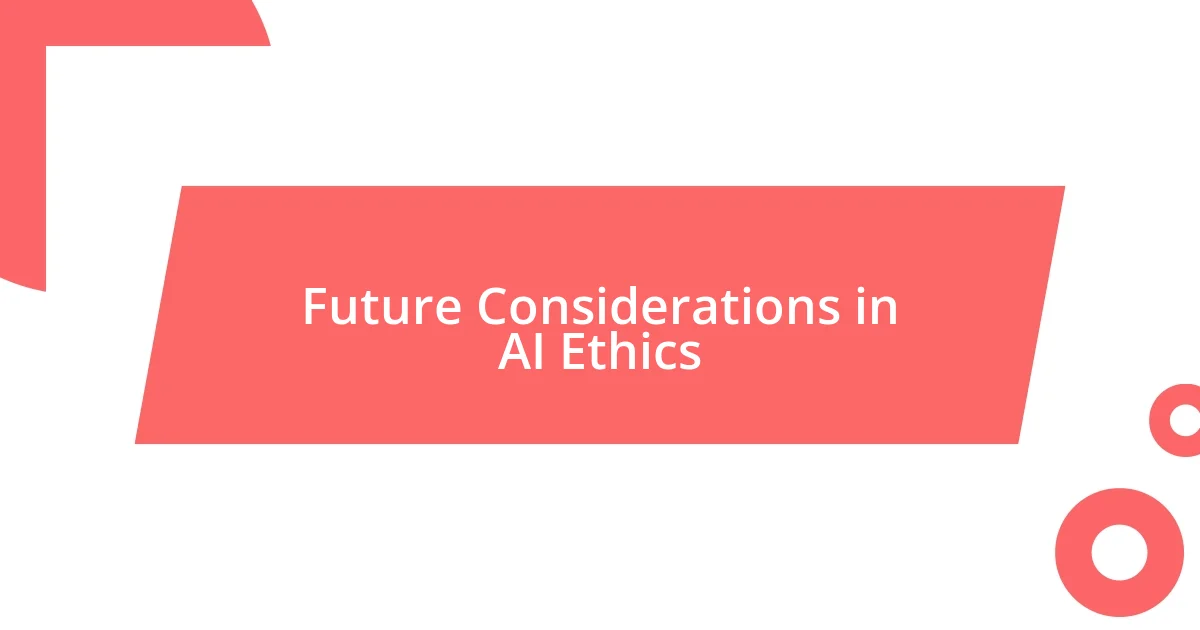
Future Considerations in AI Ethics
The future of AI ethics demands an evolving mindset that balances innovation with responsibility. I often contemplate how AI technologies will intersect with pressing societal issues, such as bias and privacy. It’s impossible to ignore the consequences of unchecked algorithms on marginalized communities. Isn’t it our duty to ensure that the advancements we champion uplift rather than diminish?
As I reflect on upcoming developments in artificial intelligence, I can’t help but think about the importance of transparency. For example, in a brainstorming session with my team, we explored ways to make our AI decision-making processes clearer to users. This sparked a discussion about accountability as well—what happens when an algorithm causes harm? I find that embedding transparency into our AI systems not only builds trust but also invites constructive dialogue about the ethical considerations involved.
Moreover, I believe that inter-disciplinary collaboration will play a crucial role in shaping the future of AI ethics. During a recent panel discussion involving technologists and ethicists, the exchange of ideas hit home for me. Each perspective added layers to our understanding of ethical dilemmas. Isn’t it fascinating how collective insights can illuminate paths we hadn’t previously considered? It convinced me that moving forward, we need to welcome diverse voices into the AI conversation, ensuring that ethical considerations aren’t an afterthought but an integral component of development.










